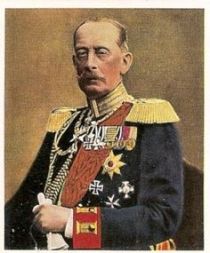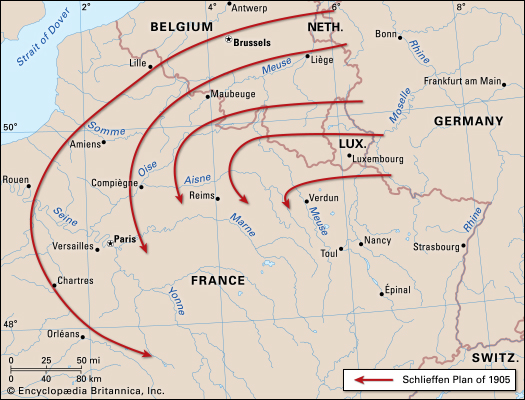A trip to Belgium in 2013 was the inspiration to write a short story called Here Lies a Soldier. After I finished, I posted it and thought that was the end. The characters, however, had something else in mind altogether. Thus, I find myself immersed in the history of The Great War so as to write the most authentic story of that time that I can.
The outbreak of war in 1914 had been planned in advance for nearly twenty years. In those preceding decades, the maneuvering for power on the Continent among the players who finally declared against each other in the early days of that fateful August, had resulted in their political and military leaders preparing plans for all the potential scenarios that might arise in the case of a general European war.
Of all the plans that had been drafted, the most important of them was that of the Germans because ultimately, its execution turned a regional war into a world war. It was called The Schlieffen Plan after it’s author, Count Alfred von Schlieffen, who served as the Chief of the German General Staff from 1891 to 1906.  The bulk of the plan had already been formulated by 1895. Minor modifications and what can only be called tampering, were the only changes that were made to the plan after Shclieffen’s retirement.
The bulk of the plan had already been formulated by 1895. Minor modifications and what can only be called tampering, were the only changes that were made to the plan after Shclieffen’s retirement.
The plan went like this:
Shielffen concluded, based on the alliances formed during his tenure, that Germany would have to fight a two front war. France had allied with Russia, therefore any war involving either of those parties would inevitably drag the other into the fray. In those days the objective was to be the fastest to mobilize. The first army to get into position would ultimately be the victor, or so it was thought. Schlieffen calculated correctly that the German army would be the fastest to mobilize, with the French second fastest and the Russian army the slowest.
If Germany could rush into position, Shlieffen believed, the two front war could be avoided. With a massive push against France in the opening weeks of a confrontation, the speedy German forces could overwhelm the French before the Russians had their troops mobilized. After quickly defeating the French, they could now send the full force of the German war machine against the sluggish Russians.
For this plan to work, several assumptions were made. One, that an engaged French army would launch an attack into the region of Allsace-Lorraine– the former French regions lost to the Germans in the Franco-Prussian War of the 1870’s. This would leave the Western borders of France weak and vulnerable. The main wing of the German army would march west, drop down through Belgium (unopposed, or so they thought) and have the French forces surrounded from The English Channel on the west to the defensive forces engaging the French offensive in Alsace-Lorraine on the east. The whole thing would take no more than six weeks. Paris would be captured and the Germans could turn their attention to the Russian army on the extreme eastern front.
Shlieffen said, “Let the right-flank grenadier brush the Channel with his sleeve.”

However, for Germany to launch the massive and speedy offensive into Western France, neutral Belgium had to be invaded. The original Shlieffen plan also called for an intrusion into a small section of the Netherlands. Schlieffen had calculated (wrongly) that, despite a treaty guaranteeing Belgium’s neutrality and Britain’s promise to uphold such, the British would stand idly by while ‘little Belgium’ was violated by the massive two million man German offensive. That alone would not prove to be the only downfall of The Schlieffen Plan.
When Schlieffen retired in 1906, he was replaced by Helmuth von Moltke, nephew of the great Field Marshall Helmuth von Moltke, director of the Wars of German Unification and military counterpart of Otto von Bismarck, the political might behind the Kaiser of united Germany. The namesake did not live up to his uncle’s reputation, however. He himself acknowledged this. Reportedly confessing to a friend he said, “I lack the capacity for risking all on a single throw.” And that kind of nerve was exactly what the Shlieffen Plan demanded in order to be successful.
Shlieffen had insisted that the strength of the right wing was critical to the success of the plan. Moltke weakened that very wing by reallocating troops (unnecessarily) to strengthen the defensive position in Alsace-Lorraine. He also opted not to violate Holland’s territory as well as Belgium’s, which meant the massive German wing (three armies) was squeezed though a narrow thirty-five mile gap between the Belgian/Holland border and the Ardennes forest. This also meant they had to fight their way past Belgium’s strongest defensive position – the fort at Liege.
Long story short – the Belgian army did not roll over and let the Germans pass. They put up a hell of a fight, slowing them down and totally disrupting the aggressor’s timetables. Additionally, the British did not stand idly by and let Belgium, whom they had sworn to defend, be invaded by the German army. They quickly declared war on Germany and sent the British Expeditionary Force into the fray.
The Germans had thought the Schieffen Plan guaranteed them victory within three or four months. And what it really guaranteed was that if victory was not achieved in that time, it would not be achieved at all. The two front war they hoped to avoid was now the reality. A reality that quickly became a nightmare.

Images via: Spartacus-educational, Wikipedia, and Britannica


Horrible. Cold, wet, trenches, gas, death. Can you imagine the smells? My god. What an awful scene that must’ve been. 😔
LikeLiked by 1 person
Absolutely. Water, mud, lice, rats and the dead bodies of their comrades. It was a horror. And such huge assumptions and blunders on all sides that dragged the thing out at the cost of all those lives.
LikeLiked by 1 person
That’s nothing new. The so-called leaders playing chess with young lives. Expendable pawns in an ego driven drama. So sad, and continues to this day. War is the dumbest thing ever. 😠
LikeLiked by 1 person
It most certainly is 😞
LikeLiked by 1 person
We never seem to learn. 😕
LikeLiked by 1 person
Meg as a history buff I really appreciate your wonderful posts and all the research you put into them. You’re a gem!
LikeLiked by 1 person
Thank you, Holly! I don’t know about you, but the First World War wasn’t covered in much detail when I was in school. Reading about the specifics is all new to me. I guess WW2 was covered more thoroughly because of America’s larger involvement. 🤯 Anyway, I’m glad you’re finding it interesting!
LikeLiked by 1 person
From a military family I learned a lot about the wars , my great grandfather gassed in France , my grandfather wounded in the pacific in WW2, my own father presented the Purple Heart 💜 in VN. Your articles are amazingly detailed and excitingly accurate. Thank you dear Meg
LikeLiked by 1 person
Thank you again. I hope to do it justice! 🙏
LikeLiked by 1 person
you do indeed!
LikeLiked by 1 person
😊
LikeLiked by 1 person
Wow! This is so fascinating, Meg. Thank you.
LikeLiked by 1 person
Thank you! Glad you found it interesting!
LikeLiked by 1 person
Very much so.
LikeLiked by 1 person
The Germans had a plan that more or less relied on on cold logic. They didn’t take into consideration treaties and the like. And they hardly ever expected the unexpected to happen.
Great work Meg!
LikeLiked by 1 person
Yes, it was all about calculations and timetables. It might have worked if Moltke hadn’t messed with the plan. Even with Belgian resistance and the BEF coming to their aid. The right wing of the German army was massive and efficient.
LikeLike
Oh, God this nerd loves these posts. Very interesting how the Germans were worried about the two front war. Preparations and actual fighting almost played out like a chess game.
LikeLiked by 1 person
Yes, with the result a stalemate that lasted till both sides were exhausted. What a disaster!
LikeLiked by 1 person
That is what happens when everyone wants to be the last man standing. Then, they do a sequel twenty years later.
LikeLiked by 1 person
Exactly right!
LikeLiked by 1 person